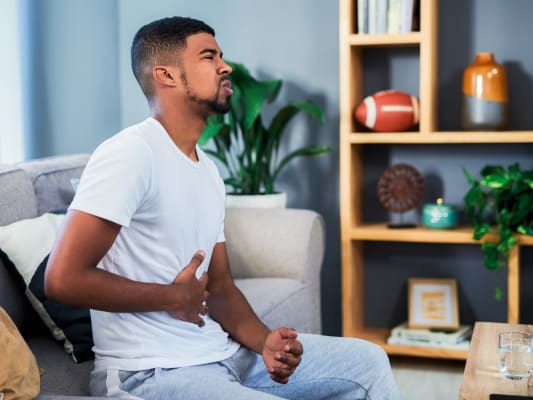Dealing With Constipation and Hemorrhoids

Constipation and hemorrhoids aren’t topics often talked about at the dinner table. However, even though you aren’t talking about your bowel habits with your friends, you should be talking with your doctor.
Constipation is fairly common, as are hemorrhoids. But what are they, and what can you do to make things better?
Constipation
Constipation is a problem with passing stool. It typically refers to when you pass fewer than three stools a week, or when you have a difficult time passing stool.
Dr. J. Michael Parker, a Middlesex Health colorectal surgeon, says it isn’t always a concern if you don’t move your bowels every day. Normal bowel function is between three times a day and once every three days, he says.
If you are affected by constipation, it can be a result of a lack of dietary fiber, fluids or exercise, or it can be caused by other medical conditions or certain medications. Constipation can be due to a problem with motility, or it can mean difficulty evacuating stool, Dr. Parker says.
Talking to your medical provider is the first step to addressing any constipation concerns. Your medical provider can then look at your medical history, take X-rays or MRIs or complete functional testing to make a diagnosis. To address your constipation, you might be asked to drink more water, eat more fiber or take supplements. Sometimes, medication and pelvic physical therapy are also recommended, and surgery may be an option if nothing else helps.
Hemorrhoids
We all have hemorrhoids, but some hemorrhoids are worse than others.
Hemorrhoids happen when veins in the anus or lower rectum swell and get inflamed. It could be a result of advancing age, diarrhea, pregnancy, pelvic tumors, prolonged sitting, straining during bowel movements or chronic constipation.
While Dr. Parker says hemorrhoids can help with bowel control, he adds that they can also cause problems. They, unfortunately, can bleed, clot, prolapse or cause other issues, such as leakage, and this could make maintaining good hygiene a challenge.
Medication can usually help with hemorrhoids. You may also need a medical procedure.
What to do to stay healthy
Dr. Parker says it’s usually a good idea to increase your consumption of non-caffeinated beverages, such as water, and to increase your fiber intake either through food or by taking supplements to improve your bowel movements. You should consume 64 ounces of fluids a day and 25 to 35 grams of fiber per day, he says, explaining that fiber bulks stool and keeps it moist, but could cause temporary bloating and excess gas if the amount of fiber is increased too quickly.
Prunes can also help your bowel movements by addressing constipation, and certain over-the-counter laxatives and stool softeners are effective and safe for short-term use.
Another tip from Dr. Parker: The best time to go to the bathroom is shortly after eating in the morning. That’s when colonic motility is the highest. But don’t go to the bathroom if you don’t have the urge, he says.
While these are certainly things you can do on your own to improve your bowel movements and limit your risk of getting hemorrhoids, ultimately the best place to start is by talking to your medical provider. You will also want to get regular colonoscopies, beginning at age 45, as a way to screen for colorectal cancer. Colonoscopies can also help identify other digestive conditions.
Featured Provider

J. Michael Parker, MD
Specialties / Areas of Care
- General Surgery
- Surgical Oncology
Locations
- Middletown, CT
860-358-2850
- View Full Profile
- Watch Video
- Schedule an Appointment
- Accepting New Patients
More Stories
Protect Those Eyes on the Sky
While a solar eclipse is a momentous occasion, it's something eye experts say you need to enjoy safely.
Tips From The Mayer Center
In recognition of Autism Acceptance Month, Middlesex Health's The Mayer Center shares tips for parents of children who may be on the autism spectrum.